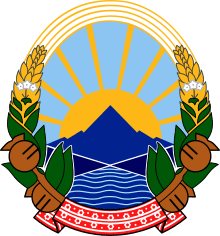Elections in North Macedonia
North Macedonia elects on national level a head of state - the president - and a legislature. The president is elected for a five-year term by the people. The Assembly of the Republic of North Macedonia (Sobranie) has 120-123 members, elected for a four-year term, by proportional representation. North Macedonia has a multi-party system, with numerous parties in which no one party often has a chance of gaining power alone, and parties must work with each other to form coalition governments.
 |
|---|
| This article is part of a series on the politics and government of North Macedonia |
|
Legislature
|
|
|
|
Last elections
Presidential elections were held in April and May, 2019.
| Candidate | Party | First round | Second round | |||
|---|---|---|---|---|---|---|
| Votes | % | Votes | % | |||
| Stevo Pendarovski | Social Democratic Union of Macedonia | 322,581 | 44.75 | 435,656 | 53.58 | |
| Gordana Siljanovska-Davkova | VMRO-DPMNE | 318,341 | 44.16 | 377,446 | 46.42 | |
| Blerim Reka | Independent | 79,888 | 11.08 | |||
| Invalid/blank votes | 32,696 | – | 30,406 | – | ||
| Total | 753,520 | 100 | 843,508 | 100 | ||
| Registered voters/turnout | 1,808,131 | 41.67 | 1,808,131 | 46.65 | ||
| Source: SEC | ||||||
Presidential
On 21 April 2019, the first round of the presidential elections resulted voters turnout receiving 41.67% of the vote. this round was not receive the support of 50% of all registered voters, and so a second round was held on 5 May 2019. In first round resulted , The SDSM Stevo Pendarovski won 44.75% of the votes and VMRO-DPMNE Gordana Siljanovska-Davkova, won 44.16% of the votes and then the second round resulted, Stevo Pendarovski won 53.58% of the votes was the main contestant win for the post, and Gordana Siljanovska-Davkova won 46.42% of the votes,
Parliamentary
The Parliamentary election took place on 11 December 2016. The incumbent ruling party, VMRO-DPMNE, got 39.39% of the votes and won 51 of the 120 seats in the Sobranie. The SDSM, won 37.38% of the votes and won 49 seats, the DUI, which is the largest Albanian party, receiving 7.72% of the votes and won 10 seats, and the Lëvizja Besa is the second largest Albanian party, receiving 5.01% of the votes and won 5 seats.
Ethnic groups
Following Macedonian independence in 1991, politics in the country are split along ethnic lines with Albanians voting for Albanian parties and Macedonians voting for Macedonian parties.[1] In this context elections have come to reflect the censuses.[1] Ethnic groups in the country view a change in the demographic composition of an administrative unit of government as resulting in a change of a mayor's ethnic affiliation that would implement the choices and priorities of their community.[1]
References
- Ragaru, Nadege (2008). "The Political Uses and Social Lives of "National Heroes": Controversies over Skanderbeg's Statue in Skopje". Südosteuropa. 56 (4): 537.CS1 maint: ref=harv (link)